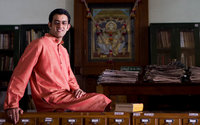Vikram Sampath
Born
Bangalore, India
Website
Twitter
Genre
More books by Vikram Sampath…
“On 1 August 1939, Savarkar spoke at a public meeting organized at Tilak Smarak Mandir in Poona. In his speech, he talked about the three different schools of thought prevalent in the Congress, led by three different leaders—Gandhi, Subhas Bose and Manabendranath Roy—and how it is different from the school of thought of the Hindu Mahasabha. He said: In today’s Congress, there are three schools of thought . . . Gandhian school of thought has truth and non-violence as its key ideas. But Gandhian non-violence is inimical to Hindutva. Hindu philosophy says violence for violence sake is bad, but violence is permissible to destroy evil and protect the good, and such violence is good conduct. But Gandhian thought makes no such distinction. They believe in non-violence under all conditions. Second school of thought is led by Subhas Bose and the Forward Bloc. His policies and means used are similar to our thought process and we could work together on certain issues, but even they are obsessed with this mirage of Hindu-Muslim unity. The third school of thought is of Manvendranath (sic) Roy and that is not acceptable to us at all. They believe in the policy of active Muslim appeasement. The Hindu Mahasabha has the interests of Hindus in mind always.”
― Savarkar: A Contested Legacy, 1924-1966
― Savarkar: A Contested Legacy, 1924-1966
“The people of the Deccan never reconciled to the fact of being governed by invaders who had occupied the throne of power at Delhi.”
― Splendours of Royal Mysore
― Splendours of Royal Mysore
“It is this social ethos that Mysore has been able to maintain, even as the rat race rushes on unabated elsewhere. It is a city that has not yet opened its eyes to avarice, urbane sophistication and the materialistic way of life. You cannot help but get transported into the past when you are in Mysore, because history for the average Mysorean is not dead, found in the cold storage of text books giving sleepless nights to many a student, but a more vibrant and enlivening aspect of their daily lives that makes them shoot at least cursory glances at all those forts, palaces, statues of their erstwhile rulers and remind themselves of the legacy they inherit. The kingdom may be long gone, but it still lives among the people, their attitudes, their daily discussions, musings and reminiscences.”
― Splendours of Royal Mysore
― Splendours of Royal Mysore
Is this you? Let us know. If not, help out and invite Vikram to Goodreads.









































